
Japan’s become pretty enamored with latte art over the past few years, with baristas all over the country creating cute characters in swirls of cream and foam. But what if you’re not a coffee drinker, either because you’re watching your caffeine intake or just because your inner child won’t let you drink anything so bitter? Is there a way for you to set your table with eye-pleasing edibles?
Sure there is! All you need is a pile of grated daikon radish, and this new book that tells you how to craft it into adorable edibles.
As one of Japan’s most widely grown domestic vegetables, there are a number of ways to prepare daikon. Just about the simplest is daikon oroshi, or grated daikon. A dollop of it is often added to grilled fish, but daikon oroshi also gets tossed into nabe hotpots pretty regularly, something more and more people are looking to eat now that the weather is getting colder.
The texture of daikon oroshi is fine enough that it’s ordinarily shapeless, but still malleable if you want to build something out of it. While growing up, many of us were told not to play with our food, but I’m guessing we didn’t have quite the mix of culinary and artistic skills as daikon oroshi artist Kimimarokku.
One of the medium’s pioneers, Kimimarokku’s work features prominently in the simply titled Daikon Oroshi Art, which explains the fundamentals for newcomers to the hobby. Kimimarokku contributed 10 pieces to the printed collection, including the polar bear seen above that was her first big hit and caused a sensation when she shared it on Twitter.
Kimimarokku says she was inspired to make the daikon oroshi for the birthday party of a polar bear-loving friend. The artist also has a younger sister who’s especially fond of pandas, so you know what that means.
She’s gotten so skilled that she’s moved on from just creating the animals themselves, and has even starting turning her hotpots into mini dioramas. Here, we see a fluffy sheep strolling along a forest path of mizuna herbs next to a grove of mushrooms.
You don’t even have to limit yourself to animals with pure white coats. By mixing in a little ginger to add some color, Kimimarokku was able to produce what might be her cutest creation yet, a family of capybaras relaxing in a bath with yuzu citrus fruits bobbing about.
While Kimimarokku is the star of the book, she’s not the sole focus, as it contains 32 entries from other individuals and even companies, such as miso maker Marukome, which made this radish version of its Marukome-kun corporate mascot.
Daikon Oroshi Art goes on sale this month at bookstores for 900 yen (US $8.25). Pick up a copy and find your own answer to the question, “Does it still count as playing with your food when you end up with a work of art?”
[ Read in Japanese ]

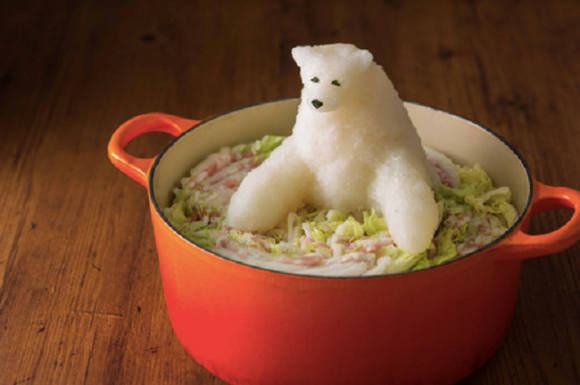
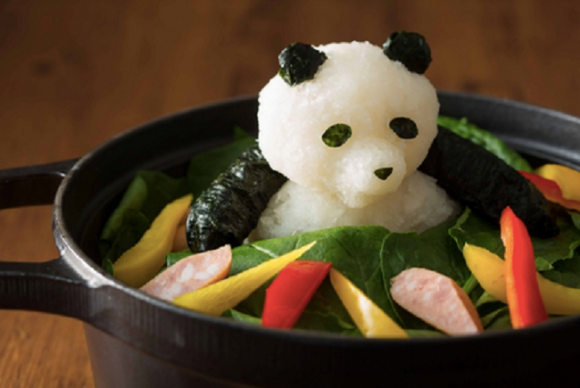
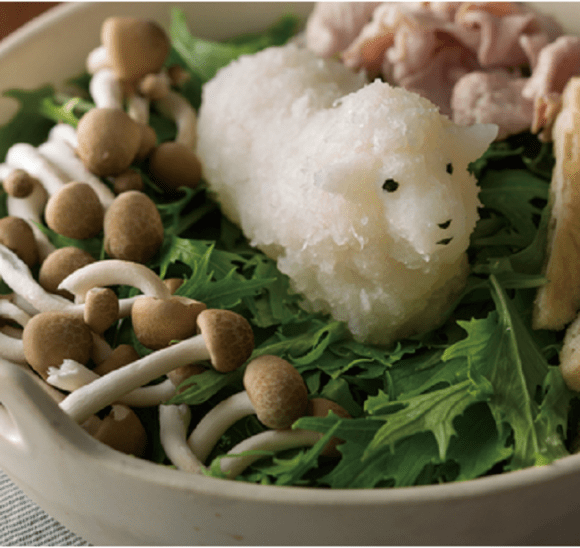
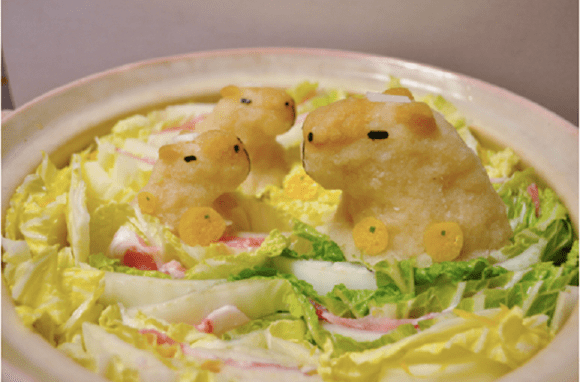

 Grated radish art from Japan brings the cute to your favourite dishes
Grated radish art from Japan brings the cute to your favourite dishes Grated white radish cat spices up traditional Japanese home cooking
Grated white radish cat spices up traditional Japanese home cooking Anime art book teaches you to draw the subtle mannerisms that make women beautiful…and butts
Anime art book teaches you to draw the subtle mannerisms that make women beautiful…and butts Flower field bento is cute, quick, and easy…just be careful not to make one mistake【Pics】
Flower field bento is cute, quick, and easy…just be careful not to make one mistake【Pics】 Enjoy latte art at home with cute marshmallow cats!
Enjoy latte art at home with cute marshmallow cats! Starbucks Japan unveils new sakura cherry blossom collection for hanami season 2026
Starbucks Japan unveils new sakura cherry blossom collection for hanami season 2026 One Piece creator has hidden secret of anime treasure’s identity in chest at bottom of real-world ocean
One Piece creator has hidden secret of anime treasure’s identity in chest at bottom of real-world ocean Is Tokyo Station’s startlingly expensive wagyu bento boxed lunch worth its high price?[Taste test]
Is Tokyo Station’s startlingly expensive wagyu bento boxed lunch worth its high price?[Taste test] Is Starbucks Japan’s new Hinamatsuri Girls’ Day Frappuccino suitable for adults?
Is Starbucks Japan’s new Hinamatsuri Girls’ Day Frappuccino suitable for adults? Sakuramochi festival sweetens things up at Tokyo’s Seibu Ikebukuro this season
Sakuramochi festival sweetens things up at Tokyo’s Seibu Ikebukuro this season Kyoto raises hotel accommodation tax to fight overtourism, travelers could pay up to 10 times more
Kyoto raises hotel accommodation tax to fight overtourism, travelers could pay up to 10 times more Sakura Festival in Chiyoda mixes illuminations, boats, music, and Rilakkuma in the heart of Tokyo
Sakura Festival in Chiyoda mixes illuminations, boats, music, and Rilakkuma in the heart of Tokyo Starbucks Japan releases new sakura goods and drinkware for cherry blossom season 2026
Starbucks Japan releases new sakura goods and drinkware for cherry blossom season 2026 Live-action One Piece’s Luffy teaches Sesame Street’s Elmo a Japanese word for friendship[Video]
Live-action One Piece’s Luffy teaches Sesame Street’s Elmo a Japanese word for friendship[Video]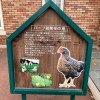 Harvester Yakumo: A restaurant inspired by the Colonel from KFC
Harvester Yakumo: A restaurant inspired by the Colonel from KFC Starbucks Japan releases first-ever Hinamatsuri Girls’ Day Frappuccino
Starbucks Japan releases first-ever Hinamatsuri Girls’ Day Frappuccino Japanese restaurant chain serves Dragon Ball donuts and Senzu Beans this spring
Japanese restaurant chain serves Dragon Ball donuts and Senzu Beans this spring Japan Extreme Budget Travel! A trip from Tokyo to Izumo for just 30,000 yen [Part 1]
Japan Extreme Budget Travel! A trip from Tokyo to Izumo for just 30,000 yen [Part 1] Highest Starbucks in Japan set to open this spring in the Tokyo sky
Highest Starbucks in Japan set to open this spring in the Tokyo sky Japan’s craziest burger chain takes menchi katsu to new extreme levels
Japan’s craziest burger chain takes menchi katsu to new extreme levels Japan Extreme Budget Travel! A trip from Tokyo to Izumo for just 30,000 yen [Part 2]
Japan Extreme Budget Travel! A trip from Tokyo to Izumo for just 30,000 yen [Part 2] Japan has only one airport named after a samurai, so let’s check out Kochi Ryoma【Photos】
Japan has only one airport named after a samurai, so let’s check out Kochi Ryoma【Photos】 Japanese drugstore sells onigiri at pre-stupid era prices, but how do they compare to 7-Eleven?
Japanese drugstore sells onigiri at pre-stupid era prices, but how do they compare to 7-Eleven? Viral Japanese cheesecake from Osaka has a lesser known rival called Aunt Wanda
Viral Japanese cheesecake from Osaka has a lesser known rival called Aunt Wanda Which convenience store onigiri rice balls are the most popular? Survey reveals surprising results
Which convenience store onigiri rice balls are the most popular? Survey reveals surprising results Japan’s newest Shinkansen has no seats…or passengers [Video]
Japan’s newest Shinkansen has no seats…or passengers [Video] Foreigners accounting for over 80 percent of off-course skiers needing rescue in Japan’s Hokkaido
Foreigners accounting for over 80 percent of off-course skiers needing rescue in Japan’s Hokkaido Super-salty pizza sends six kids to the hospital in Japan, linguistics blamed
Super-salty pizza sends six kids to the hospital in Japan, linguistics blamed Starbucks Japan unveils new sakura Frappuccino for cherry blossom season 2026
Starbucks Japan unveils new sakura Frappuccino for cherry blossom season 2026 Foreign tourists in Japan will get free Shinkansen tickets to promote regional tourism
Foreign tourists in Japan will get free Shinkansen tickets to promote regional tourism The 10 most annoying things foreign tourists do on Japanese trains, according to locals
The 10 most annoying things foreign tourists do on Japanese trains, according to locals Take a trip to Japan’s Dododo Land, the most irritating place on Earth
Take a trip to Japan’s Dododo Land, the most irritating place on Earth Naruto and Converse team up for new line of shinobi sneakers[Photos]
Naruto and Converse team up for new line of shinobi sneakers[Photos] Is China’s don’t-go-to-Japan warning affecting the lines at a popular Tokyo gyukatsu restaurant?
Is China’s don’t-go-to-Japan warning affecting the lines at a popular Tokyo gyukatsu restaurant? Survey asks foreign tourists what bothered them in Japan, more than half gave same answer
Survey asks foreign tourists what bothered them in Japan, more than half gave same answer Japan’s human washing machines will go on sale to general public, demos to be held in Tokyo
Japan’s human washing machines will go on sale to general public, demos to be held in Tokyo Starbucks Japan releases new drinkware and goods for Valentine’s Day
Starbucks Japan releases new drinkware and goods for Valentine’s Day We deeply regret going into this tunnel on our walk in the mountains of Japan
We deeply regret going into this tunnel on our walk in the mountains of Japan Studio Ghibli releases Kodama forest spirits from Princess Mononoke to light up your home
Studio Ghibli releases Kodama forest spirits from Princess Mononoke to light up your home Major Japanese hotel chain says reservations via overseas booking sites may not be valid
Major Japanese hotel chain says reservations via overseas booking sites may not be valid Put sesame oil in your coffee? Japanese maker says it’s the best way to start your day【Taste test】
Put sesame oil in your coffee? Japanese maker says it’s the best way to start your day【Taste test】 No more using real katana for tourism activities, Japan’s National Police Agency says
No more using real katana for tourism activities, Japan’s National Police Agency says 3-D green tea latte art adds a splash of whimsy and color to your cup
3-D green tea latte art adds a splash of whimsy and color to your cup All 151 original Pokémon now available as Tokyo Pokémon Cafe latte art, and you choose your own
All 151 original Pokémon now available as Tokyo Pokémon Cafe latte art, and you choose your own Artist makes cool Gundam, tanks, and rifles out of Amazon boxes to show they’re all secretly cute
Artist makes cool Gundam, tanks, and rifles out of Amazon boxes to show they’re all secretly cute Pettable Pokémon, transforming Mario ghost latte art made by amazing Japanese artist【Videos】
Pettable Pokémon, transforming Mario ghost latte art made by amazing Japanese artist【Videos】 Random shadow on wall gets anime-style fan art as artists prove they can find cute girls anywhere
Random shadow on wall gets anime-style fan art as artists prove they can find cute girls anywhere Genius shows how to turn your car into an anime art itasha for free【Photos】
Genius shows how to turn your car into an anime art itasha for free【Photos】 Busty or boobless? Japanese Twitter debates which makes for more beautiful kimono anime art
Busty or boobless? Japanese Twitter debates which makes for more beautiful kimono anime art 30 hours of pumpkin carving! The making of my anime fan art jack-o’-lantern【Photos & video】
30 hours of pumpkin carving! The making of my anime fan art jack-o’-lantern【Photos & video】